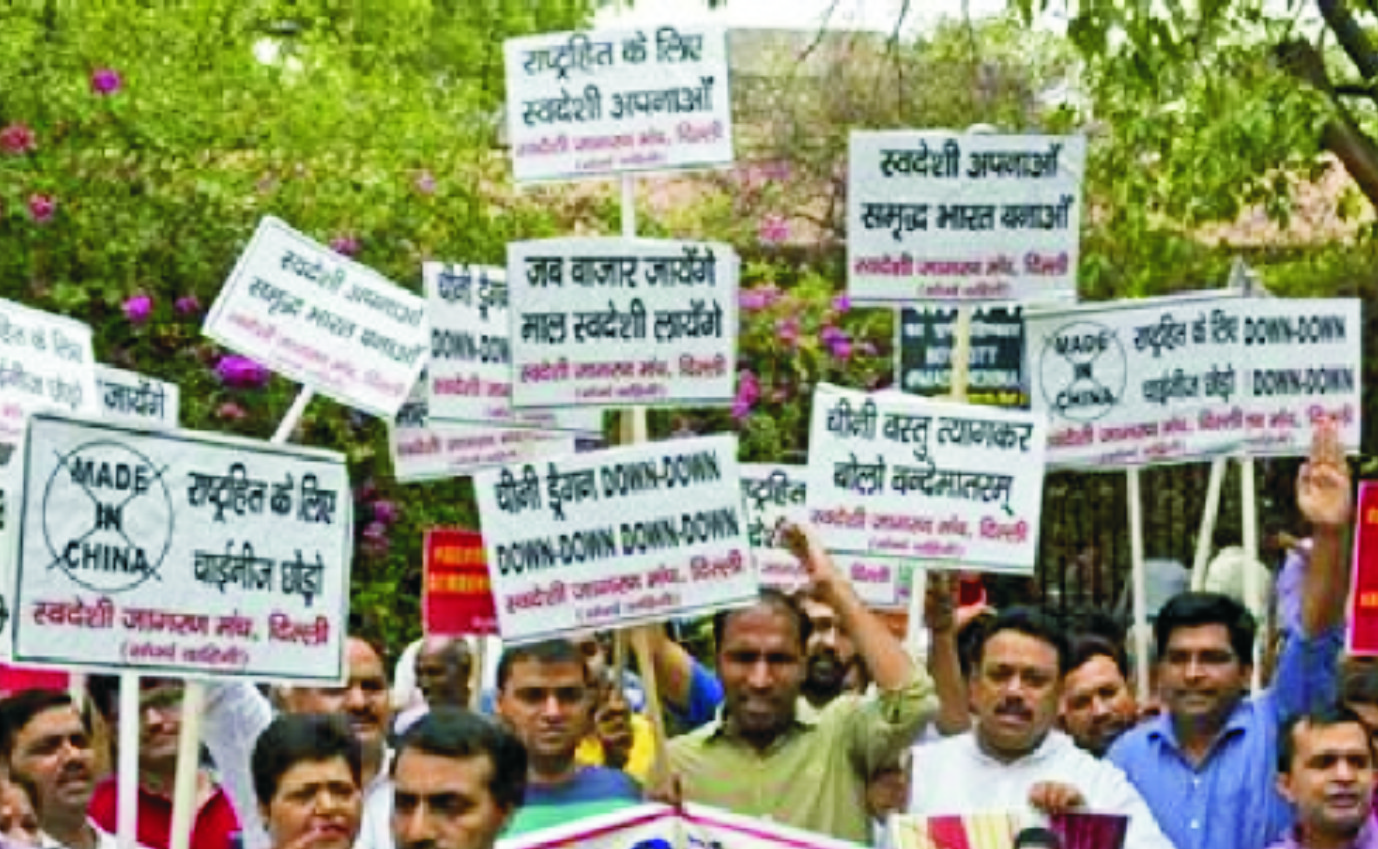
No day dreaming, Self-Reliant India is a Reality
If the appeal to boycott Chinese goods gets spread, then in the coming years there can be further significant decrease in imports from China and our self-reliance efforts would get a boost. — Dr. Ashwani Mahajan
After the new economic policy started in 1991, the policy makers were so much obsessed with the idea of globalization, that they were hardly concerned about domestic manufacturing production, protection and promotion of industries, self-reliance etc. With constant reduction in tariffs message was being sent to the world indicating that they could sell their goods in India at minimal tariff. It was also being said that due to lower tariffs, spare parts and finished goods coming from abroad, consumers will get cheaper goods and their standard of living will be better. But the country witnessed constantly widening foreign trade deficit, since 1991 and more rapidly after 2001 and it had reached 190 billion dollars by the year 2012-13. After 2013, our trade deficit softened after decline in international oil prices. However, even after that it remained high (and reached around $ 184 billion dollars in 2018-19). It can be understood that since we were importing so much that our dependence on other countries, especially China has increased enormously. Our industries either shut down or started working at levels far below their capacity. This directly impacted our employment generation. It is well known that on the one hand our unemployment started increasing due to decline in manufacturing due to indiscriminate increase in imports and lack of employment generation opportunities in traditional agriculture on the one hand and due to limited and sometimes decreasing employment opportunities in the service sector on the other. It is being said that today we are facing an unprecedented problem of unemployment. The rate of youth unemployment is even higher than that. The dependence on China for many medical devices, including APIs, face masks, PPE kits, and testing kits panicked not only India, but the entire world. At the same time it was realised that the economists who were advocating for opening of agricultural markets completely for import and not thinking of self-sufficiency in food sector, in fact were misleading the country. It can be understood that the obsession for globalization was so overwhelming that they could not foresee the imperative of food self-sufficiency for the survival of the countrymen in the event of war or epidemic. Now the policy makers have understood that if the poor could be provided food in the entire country or if all the countrymen are able to meet their food needs during the lock-down, it is our self-sufficiency in food, which could make it possible. Significantly, we are self-sufficient in most of the items including food grains, pulses, fruits, vegetables and milk except edible oils.
Prime Minister’s Call
After making an emotional appeal for the use of Khadi and the local products for a long time, Prime Minister Narendra Modi has now given a call in his address to the nation urging and encouraging the purchase of local products, as a lesson learnt from this pandemic. On 12 May, he has given the slogan of ‘Vocal for Local’. And he has also reiterated the goal of self-reliant India. The way the pandemic spread from the city of Wuhan in China and also the way its reality was hidden from the rest of the world and world was kept in complete dark, China did a heinous act of seeding of this disease into the world. The whole world is not only angry with China; there is an atmosphere of boycott of Chinese goods all over the world. In such a situation, most people in India are vowing to boycott Chinese goods. Sonam Wangchuk, a well-known social activist of Ladakh and winner of Magsaysay Award, has given the message of boycott of Chinese goods, which has gone viral and strengthened the movement against China. People are boycotting Chinese goods, removing TikTok and other Chinese apps from their mobile phones; issuing alerts about threats from China on social media, suggesting Indian options, urging government about stopping Chinese imports. Demand to keep Chinese companies out of all tenders has started gaining momentum. The idea of boycott of China and self-reliance has become synonymous. In such a situation, there has been a churning amongst the social activists, media and policy makers whether this call of self-reliance is practical or just a dream.
No distant dream, it’s a reality
But there are some people who are trying to create this impression that the Chinese boycott cannot be successful. Although they are unable to oppose boycott of China under the present circumstances, they are trying to prove that India does not have the capacity to substitute Chinese goods and make the boycott successful. They offer some examples that today we are highly dependent on China and other countries for our different types of needs. As we lack competitiveness, self reliance is a distant dream. They argue that we depend on China for Active pharmaceutical ingredients (APIs) electronics components, machinery etc. Therefore, the boycott of China will increase the cost of these industries and we will be out of the competition.
It is true that, not only we will have to build capacity, we also have to be competitive, which is still a bit challenging, because Chinese goods are very cheap due to large scale dumping by China and other illicit practices including under-invoicing. Therefore, on the one hand Indian industries will have to work hard; government will also have to lend a helping hand by supporting industry through financial and fiscal measures as well as protecting them from unfair trade by way of anti-dumping duties, tariff hikes and non tariff barriers on Chinese imports.
In the field of electronic and telecom, we are yet to make a start. India’s capacity in the machinery industry is also very weak; we are behind China in metals and chemicals, so how to be self-reliant?
It is being said that our capacity in active pharmaceutical ingredients (API) has been drastically eroded, so we will have to import them from China. It is true that due to dumping of Chinese goods and apathy of the governments for long, India’s industries were destroyed, but today we have also proved our potential in the time of pandemic. Unprecedented increase in production of PPE kits, face masks, testing kits, ventilators etc is a living example of the same. It should not be forgotten that we sent Mangalyaan to Mars, even before China; space program PSLV, software, missile programs etc. all reflect India’s capabilities. APIs which are frequently cited as example; we should not forget that 90% of all APIs that come from China today, used to be made in the country. Our API industry was affected by unequal competition due to China’s dumping. Significantly, a Rs 3000 crore package has already been announced by the government to revive the API industry. On the other hand, a package of 42 thousand crore rupees is also being brought for electronics. We should not forget that even partial boycott by the people of the country and imposition of anti-dumping duties by the government, increase in import tariffs and non-tariff barriers in the form of standards, imports from China, which had been steadily increasing, have come down considerably. Between 2017-18 and 2018-19, our steel imports from China decreased by 18%; organic chemicals’ imports also decreased by 18%, import of inorganic chemicals cane down by whopping 38% and in electronics imports declined by 17%. If we see overall trade deficit with China, the same has been declining since 2017-18. It was $63 billion in 2017-18, came down to $53.6 billion in 2018-19 and now $48.6 billion in 2019-20. These figures nullify the argument of impossibility of self reliance. This is the result of partial boycott by people and some measures by the government in the past. If the appeal to boycott Chinese goods gets spread, then in the coming years there can be further significant decrease in imports from China and our self-reliance efforts would get a boost.


